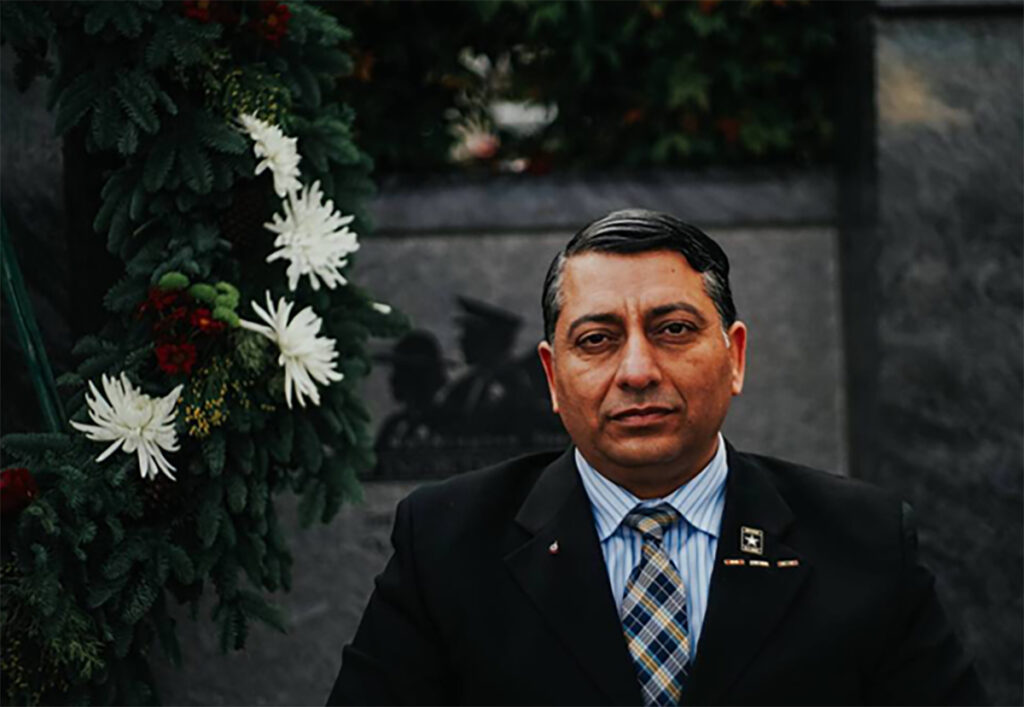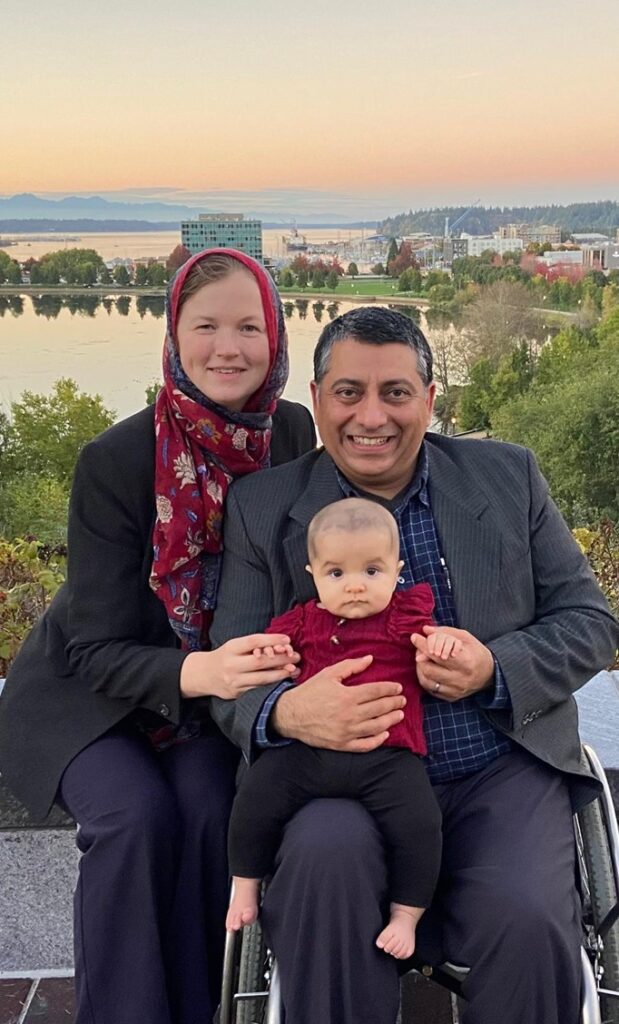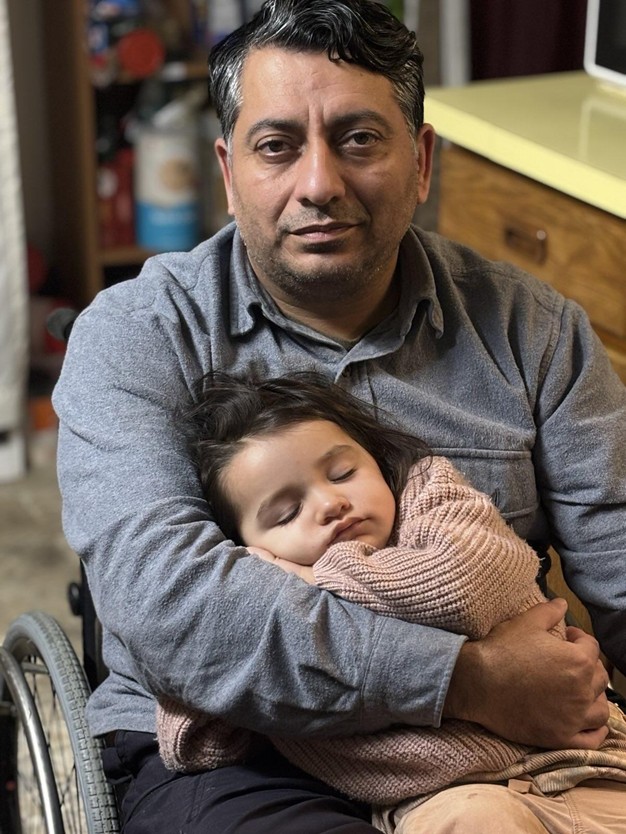By Carolyn Bick
NORTHWEST ASIAN WEEKLY

Zahid and family (wife Melissa, children Salma and Adil – whose names mean “Peace” and “Justice,” respectively), June 2025 (Photo from Melissa Chaudhry)
“Our son started walking. Took his first ever confident dozen steps,” Melissa Chaudhry told the Northwest Asian Weekly. But her husband, Muhammad Zahid Chaudhry, was not there to see it.
He has been imprisoned for more than three weeks at the for-profit, GEO Group-owned Northwest Detention Center (NWDC) in Tacoma. In that short time, Zahid had already been served moldy food, received only two pieces of bread for dinner on one night, and waited until 2 a.m. to be fed on another. And his case, like the conditions he now endures, reveals just how deeply broken the immigration enforcement system has become.

M. Zahid Chaudhry on Dec. 12, 2022, the Chaudhrys’ wedding day (Photo from Melissa Chaudhry)
Born in Pakistan, Zahid—a decorated, disabled war veteran and legal permanent resident with no criminal record—has been incarcerated at NWDC since Aug. 21. Immigration officials arrested him immediately outside what was allegedly a naturalization hearing, right after U.S. Citizenship and Immigration Services (USCIS) told him they would take a few days to decide his case.
Despite his family putting in a motion with the Ninth Circuit Court of Appeals for a temporary stay of removal upon his arrest, they learned on Sunday, Sept. 7 that the government had filed an opposition to their motion on Tuesday, Sept. 2.
Melissa, who was a 2024 U.S. Congressional candidate, said that “the default in law is that that stay is issued immediately.”
“They will grant you that protection from deportation as soon as you file that request, while they are considering it,” she said. “That default to protect is there because we’ve seen abuses of deportations all across the board.”
Melissa, who has been posting regular updates about her husband’s situation, is now raising concerns that immigration authorities may have made key decisions about Zahid’s case behind the scenes, didn’t inform him or his family properly, and moved forward with arrest and detention based on an outdated, unserved deportation order—all while giving the appearance that due process was still unfolding.
Background
Zahid moved to the United States in 2000, and married a U.S. citizen in January 2001, thereby obtaining legal permanent resident status that has never been revoked. He enlisted in the Washington Army National Guard in April 2001.

Corporal M. Zahid Chaudhry in 2004, prior to his injuries (Photo from Melissa Chaudhry)
Following a service-related injury that left him wheelchair-bound, Zahid was honorably discharged from the National Guard in 2005. That same year, he applied for U.S. citizenship based on his military service.
In applying for citizenship, however, Zahid willingly disclosed that he had a prior criminal conviction in Australia, resulting from a plea deal he told Melissa he was coerced to take. He pled guilty to misuse of another person’s passport and credit card, resulting in a conviction. However, he has consistently maintained in the court record throughout two decades of litigation in the U.S. that he was innocent of the original wrongdoing.
These disclosures have been cited in the government’s long-running efforts to remove him from the country—a process that has stretched over 20 years. Zahid has never had his legal green card revoked, and does not have a criminal history in the U.S. He is currently challenging his removal proceedings before the Ninth Circuit Court of Appeals.

Zahid Chaudhry, wife Melissa, daughter Salma age 5 months, in October 2023 (Photo from Melissa Chaudhry)
Questionable timing
Melissa said that parts of Zahid’s case don’t make sense—especially the timing of his arrest, the denial of his naturalization application, and the judge’s decision to deny him bond.
On Aug. 5, Zahid received an order from the Ninth Circuit Court of Appeals that appeared to indicate the court was poised to grant him a favorable summary judgment—“and that same day,” Melissa said, “six interview notices came to us from USCIS saying show up on [Aug. 21] at 8 a.m.”
“The same day,” she emphasized. “And those were in response to multiple [citizenship application forms] N-400s that they’d been ignoring for years. There was no action on those for many years, and then finally—same day, really? Really? And you want us to believe this wasn’t premeditated?”
Melissa spent the night before her husband’s hearing, sleepless, preparing various emergency documents, including a rapid response script and putting together legal and press contacts lists.
Everything unfolded exactly as she had feared. Officials from Immigration and Customs Enforcement (ICE) took him into custody—despite what USCIS had just said.

Melissa Chaudhry and supporter the moment after being given the news. (Photo from Melissa Chaudhry)
“The first person … who came out to meet us and a couple dozen supporters on the morning of the interview … wouldn’t give his name, even when we asked three times,” Melissa recalled. “He wore an immaculate suit, black jacket, white shirt, silver little tie clip. His hands were shaking heavily.”
“And all of us,” she continued, “me, my dad—we’re all looking at each other like, ‘There’s a lot of pressure on this human from somewhere.’”
On Aug. 21, Zahid appeared at the USCIS office in Seattle for his naturalization interview, where ICE agents subsequently arrested him, immediately after his interview. Melissa said ICE agents were waiting in the hall to arrest him. On Aug. 22, Melissa filed a temporary stay of removal with the Ninth Circuit Court of Appeals.
On Aug. 23, Melissa received an email forwarded from Rep. Adam Smith’s office. It was an email from ICE saying Zahid had a “final order of removal”—basically, an old deportation order that allowed ICE to take him into custody. But that order was from 2008.
And here’s where things get complicated: In 2018, a judge had reaffirmed that Zahid still held legal permanent resident status, and given him waivers for any legal issues prior to that date—in other words, that he still had his green card. Melissa said that since then, the government never issued a new removal order or formally acted on the old one.
Later, again through Rep. Smith’s office, Melissa learned that USCIS had already decided to deny Zahid’s citizenship application, even though they told him they hadn’t made a decision yet. In an update to the congressman’s office on Aug. 28, ICE confirmed that once it learned about the denial—and saw that there was a final order of removal on file—they decided to detain Zahid, which they did on Aug. 21.
On Aug. 29, immigration Judge Theresa Scala—a former ICE attorney—held Chaudhry’s bond hearing, but said she couldn’t make a decision. According to Melissa, the judge said she would need several days to review the case, meaning her decision should have come in early September.
The family then “put a ton of effort” into getting relevant legal documents and supplemental findings to the court. Melissa said that they had to mail in some of those documents, because they would not accept the documents from her directly.
To make matters more difficult, Zahid’s bond hearing was held on the cusp of Labor Day weekend—a federal holiday, which means that everything from the United States Postal Service to the courts would be closed.
Although the court is located in the same building as the NWDC, physically delivering the documents was not allowed.
“[We were] overnighting stuff to the court because they wouldn’t accept a filing from me,” Melissa explained. “They count me as a third party, even though my husband’s a pro se and I’m supporting him with the paperwork.”
But Judge Scala signed the order denying Zahid’s bond on Aug. 29, the exact same day as the bond hearing, Melissa later found out. Melissa raised concerns that the decision appears to have been made ahead of time.
Adding to those concerns, Melissa said Judge Scala repeatedly refused to allow any part of the hearing to be recorded, either by audio or video. However, Melissa said, more than 20 people physically packed the courtroom, with at least 30 more attending via Zoom to witness the proceedings. Attendees included state Reps. Mia Gregerson and Strom Peterson.

M. Zahid Chaudhry holding his sleeping daughter Salma, whose name means “Peace” (Photo from Melissa Chaudhry)
Inside the walls of NWDC
From the moment of his arrest, Zahid has been denied a personal care attendant—a possible violation of the Americans with Disabilities Act—and has suffered the detention center’s already well-documented inhumane conditions, including packing the center to capacity.
Melissa also said that the detention center made her husband sign for four jumpsuits. But he received only one.
“They’re charging the government for four jumpsuits and probably a 300% markup,” Melissa said. “So our taxpayer money right now is being used for private profit.”
In late August, both legislators and the courts finally opened the way for Washington public health officials to enter the NWDC to officially inspect living conditions. Since 2023, the state has attempted seven times to conduct an inspection. It wasn’t until the passage of House Bill 1470 in 2023 and an Aug. 19 Ninth Circuit Court of Appeals ruling that overturned a district court’s decision to block health officials from inspection that the state was finally able to move forward.
Melissa said that her husband has spoken with many people who are still imprisoned, despite courts ordering their release several months ago. He’s also spoken with people who have agreed to self-deport, and who still remain incarcerated in the detention center.
Melissa said that many of the people in the NWDC are “not waiting for trial. They’re not under any criminal charges—immigration is a civil matter, not criminal. They’re just being held for profit.”
“They try to keep that facility at max capacity,” she continued, “so they don’t really want empty beds. Empty beds are a loss of profit. There is not a clear path to justice in this system.”



